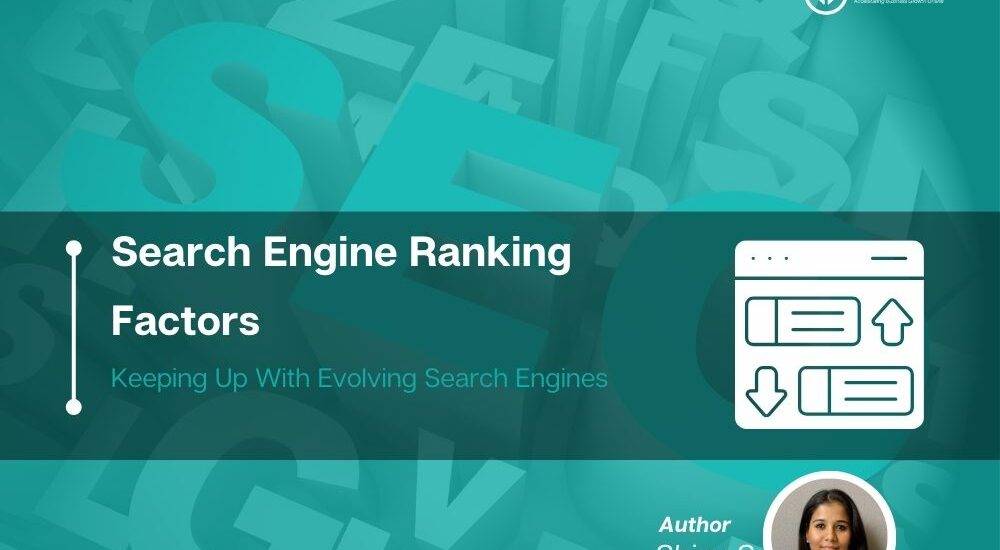Search Engine Ranking Factors
Keeping Up With Evolving Search Engines

A search engine ranking factor is any aspect or element that a search engine algorithm considers when determining the position of a web page in its search results pages (SERPs) for a given query. These factors consider the relevance, authority, and quality of search intent.
Search engines like Google use hundreds of ranking factors to consider and rank web pages, with some factors carrying more importance than others. These factors are updated to provide users with the most relevant and high-quality search results.
Understanding Search Engine Ranking Factors
Search engines utilize complex algorithms to determine the relevance and control of web pages in response to user queries. Google has refined its algorithms regularly to improve user experience and deliver accurate results. While the exact algorithms remain exclusive, Google has provided an understanding of various ranking factors that influence search results. These factors can be on-page, off-page, and technical aspects.
Content Quality:
- High-quality, relevant, and engaging content is crucial for SEO success.
- Content should be well-written, informative, and address the user’s query.
Keyword Optimization:
- Placement of Strategic keywords in titles, headings, meta descriptions, and throughout the content.
- It helps search engines understand the applicability of the page to specific queries.
User Experience:
- Factors like page load speed, mobile-friendliness, and impulsive navigation contribute to a positive user experience and, in turn, influence rankings.
Multimedia Content:
- Including images, videos, and infographics improves user engagement and enriches the content, improving its search engine visibility.
Backlinks:
- The number and quality of backlinks indicating to a website are crucial off-page factors.
- High-authority backlinks from reputable sources signal Search engines on content trustworthy and valuable.
Social Signals:
- Social media activity, likes, shares, and comments can impact search engine rankings.
- It increases visibility and drives traffic to the website.
Brand Mentions:
- Mentions of a brand or website across the web, without a hyperlink, can contribute to its authority and credibility in the eyes of search engines.
Site Structure:
- A well-organized site with a clear hierarchy and internal linking facilitates search engine crawlers’ navigation and indexing of the website.
Mobile Optimization:
- With the increase in mobile devices, optimizing websites for mobile users has become crucial for SEO success.
Schema Markup:
- Implementation of schema markup helps search engines better understand the content on a webpage.
- It leads to enhanced visibility in rich snippets and featured snippets.
Keeping Up With Evolving Trends
As search engines refine their algorithms and introduce new ranking factors, staying ahead of the latest trends and best practices is essential for maintaining and improving search engine visibility. Below are some strategies to keep up with evolving search engine ranking factors:
Follow Official Announcements:
- Google and other major search engines occasionally make official announcements about updates to their algorithms or changes in ranking factors.
- Follow their official blogs or social media accounts that can provide valuable insights into upcoming changes.
Monitor Industry News and Blogs:
- Many reputable blogs, websites, and forums dedicates to SEO and Marketing.
- These sources often discuss changes in search engine algorithms and provide analysis and recommendations for adaptation.
Attend Conferences and Webinars:
- SEO conferences, webinars, and workshops offer opportunities to learn from industry experts and stay updated with the latest trends and best practices in search engine optimization.
Engage in Online Communities:
- Participating in online communities like forums, LinkedIn groups, or subreddits focused on SEO.
- It can help to be informed about algorithm updates, share insights with counterparts, and ask questions when unsure about a particular change.
Experiment and Test:
- SEO is as much about experimentation and testing as it is about following guidelines.
- Conduct experiments and closely monitor the results to gain valuable insights into how search engine algorithms evolve and what factors are most important for the website or niche.
Utilize Tools and Analytics:
- Various SEO tools and analytics platforms can help to track changes in the website’s performance.
- Identify areas for improvement and monitor fluctuations in search engine rankings.
- Tools like Google Analytics, Google Search Console, SEMrush, Moz, and Ahrefs offer valuable insights into keyword rankings, traffic trends, and more
Stay Flexible and Adapt:
- SEO is constantly changing, so it’s essential to remain flexible and adaptable.
- What works today can not or may not work tomorrow, so be prepared to adjust the strategies and tactics accordingly.
Focus on User Experience:
- Search engine algorithms may change, but the underlying goal remains the same.
- It provides users with the most relevant and high-quality content.
- By delivering a great user experience through valuable content, intuitive navigation, fast loading times, and mobile responsiveness, one can future-proof the website against algorithm updates.
Diversify SEO strategies:
- SEO strategies beyond traditional tactics like keyword optimization and link building diversified.
- Explore emerging trends like voice search optimization, local SEO, and video SEO.
- Experiment with different types of content formats, distribution channels, and promotional strategies to reach a broader audience and improve search engine visibility.
Conclusion:
In the fast-paced world of SEO, keeping up with evolving search engine ranking factors is essential for maintaining and improving website visibility and traffic.
By understanding the various on-page, off-page, and technical factors that influence search engine rankings and adopting a farsighted approach to adaptation and optimization, businesses and individuals can stay ahead in the competitive digital landscape.
With continuous learning, data analysis, adaptability, user-centricity, and diversification as guiding principles, navigating the dynamic SEO environment becomes rewarding in driving organic growth and success online.






